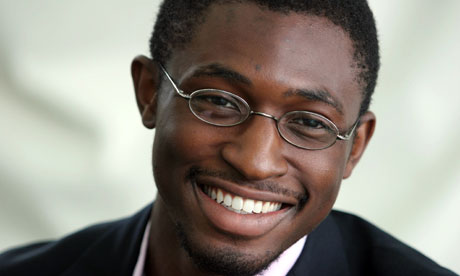
Uzodinma Iweala's startling talent erupted five years ago when, aged 24, he joined the ranks of Granta's Best Young American Novelists. His debut, Beasts of No Nation, about child soldiers in west Africa, has been translated into 11 languages and showered with prizes.
Washington-born Iweala is the son of Ngozi Okonjo-Iweala, the Nigerian finance minister who recently made a failed bid to become the first African head of the World Bank. He is also a doctor and his new book, years in the writing, is an attempt to explain why Aids has hit Africa so much harder than anywhere else.
Our Kind of People proves a disappointing switch to non-fiction. While Iweala poses many pertinent questions about Aids and Africa, most notably the way this relationship is defined from outside, he fails to provide answers beyond the anecdotal. Even his novelist's gift for intimate description falls surprisingly flat, despite the open goal offered by his travels around Nigeria.
With a foot in both camps, Iweala's strength is his alertness to post-Edward Said critiques of western conceptions of Africa. It was in New York in 2006, at a lecture about Aids, that he heard a speaker refer to Africans as "dropping like flies": "'Dropping like flies' is an often used and, as a result, rather innocuous simile," he recalls. "But in that context it made me wonder: is this how Africans are considered, as insects, animals, not human?"
He "suddenly felt very aware of and protective of my African-ness". So what does it mean to say, he asks, that of the estimated 33.3m people in the world who are HIV positive, some 22.5m are in sub-Saharan Africa? In search of an answer, he makes several trips to Nigeria, where around 3m people are living with HIV – the third highest HIV-positive population in the world.
What follows is a succession of interviews with people ranging from health activists to motorists; policemen to prostitutes. The conversations do produce flashes of insight on sex, death and stigma, but too often descend into leaden banality.
More compelling is his argument that a warped perspective manifest in Joseph Conrad's description of "black shadows of disease and starvation" still persists in reporting by the likes of CNN, the New York Times and the New Yorker. "Disease is African-ness and African-ness is a disease," he writes. "So powerful is this association that a condition attributable to approximately 4% of the African continent's population becomes the narrative for the other 96%."
Iweala also points out how, having emerged as a "gay disease" in 1980s America, Aids has always been linked with the idea of transgressive sexuality, which has dovetailed with timeworn caricatures of Africans as sexually promiscuous.
An Aids scientist tells Iweala that Africans are no more promiscuous than westerners – the average number of partners is about the same – but have different patterns of sexual interaction. While people in the west tend to have one monogamous relationship at a time, the theory goes, in Africa there is a higher frequency of concurrent relationships that create "sexual networks" likely to transmit HIV faster. Poverty is also cited as both a cause and symptom of the epidemic.
Iweala does humanise the faceless victims of Aids in Africa, but he is guilty of using Nigeria to generalise about the entire continent. There is insufficient consideration of how the western prejudice he diagnoses produced an extreme reaction in countries such as South Africa, where former president Thabo Mbeki questioned the link between HIV and Aids and accused the pharmaceutical industry of conspiracy. Mbeki's "Aids denialism" was estimated by Harvard to have led to more than 300,000 unnecessary deaths, though the country – under Mbeki's polygamous successor – is now hailed as a leader in testing and treatment. Such case studies could have helped to make this a deeper, more substantial work. In their absence, Our Kind of People might have been an excellent long magazine article. It does not quite add up to a book.

